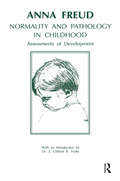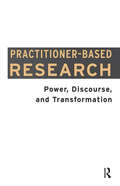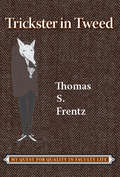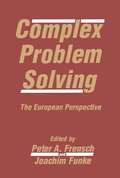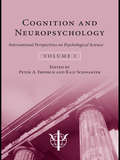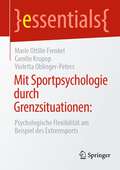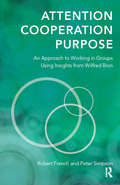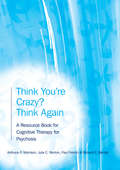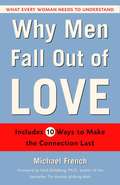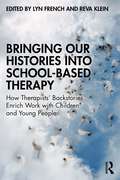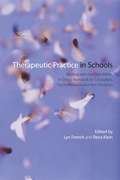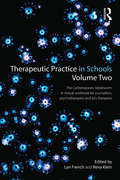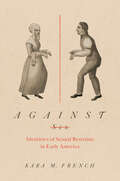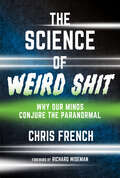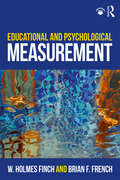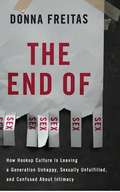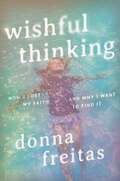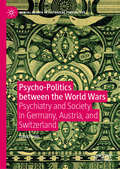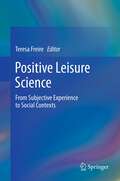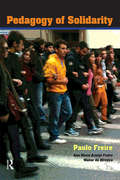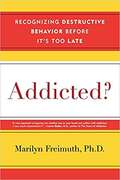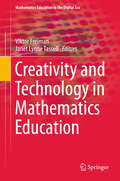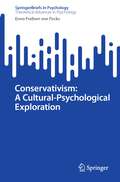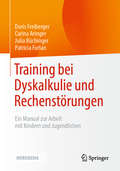- Table View
- List View
Normality and Pathology in Childhood: Assessments of Development (Writings Of Anna Freud #Vol. 6)
by Anna FreudThe author's book deals with a most neglected aspect of psychoanalysis - normality. Its chief concern is with the ordinary problems of upbringing which face all parents and the usual phenomena encountered by every clinician. Yet, though primarily practical and clinical in its approach, it also makes a major theoretical contribution to psychology. The author begins with an account of the development of analytic child psychology, its techniques and its sources in child and adult analysis and direct observation of the child. The author then describes the course of normal development, how it can be hindered or eased, what are the unavoidable stresses and strains and how variations of normality occur. The author outlines a scheme for assessing normality and for gauging and classifying pathological phenomena in terms of the obstruction of normal progress rather than the severity of symptoms. Stress is laid on the problem of predicting the outcome of infantile factors for adult pathology in the face of the child's continual development. Finally, child analysis is considered both as a therapeutic method and as a means for the advance of knowledge.
Practitioner-Based Research: Power, Discourse and Transformation
by Dawn Freshwater John LeesPractitioner-Based Research is concerned, in particular, with the research which is undertaken by healthcare practitioners and the evidence which they generate as a result of investigating their practice. In so doing it recognizes that, as well as working in academic life, practitioner researchers are often working as practitioners outside the Academy. It argues that the work of practitioner researchers has a significant contribution to make to healthcare research and so needs to be disseminated further in order to create balanced research communities within the healthcare professions. This book will help academic researchers to broaden the limited ontological and epistemological perspectives of their research. It will also encourage healthcare practitioners who have not been trained academically to develop their research skills and to realize that they are actually researching in their practice on a day-to-day basis. Finally, it will provide a degree of transparency about therapeutic processes to help clients and patients to see aspects of professional practice and development which are usually hidden from them.
Trickster in Tweed: The Quest for Quality in a Faculty Life (Writing Lives: Ethnographic Narratives)
by Thomas S FrentzHow do academics survive the bureaucracy, the petty jealousies, the absurdities of operating in the university? More important, how do they, as humans, cope with the darker shadows that enter professional lives-- illness, sorrow, death? Coyote, The Trickster, a well known figure in the American Indian world, is also the icon for communication scholar Tom Frentz. Frentz uses the survival strategies of The Trickster in his articulate, amusing, and often emotional autoethnography of striving for quality through the worlds of academia and medicine.
Complex Problem Solving: The European Perspective
by Peter A. Frensch Joachim FunkeThis volume presents a state-of-the-science review of the most promising current European research -- and its historic roots of research -- on complex problem solving (CPS) in Europe. It is an attempt to close the knowledge gap among American scholars regarding the European approach to understanding CPS. Although most of the American researchers are well aware of the fact that CPS has been a very active research area in Europe for quite some time, they do not know any specifics about even the most important research. Part of the reason for this lack of knowledge is undoubtedly the fact that European researchers -- for the most part -- have been rather reluctant to publish their work in English-language journals. The book concentrates on European research because the basic approach European scholars have taken to studying CPS is very different from one taken by North American researchers. Traditionally, American scholars have been studying CPS in "natural" domains -- physics, reading, writing, and chess playing -- concentrating primarily on exploring novice-expert differences and the acquisition of a complex skill. European scholars, in contrast, have been primarily concerned with problem solving behavior in artificially generated, mostly computerized, complex systems. While the American approach has the advantage of high external validity, the European approach has the advantage of system variables that can be systematically manipulated to reveal the effects of system parameters on CPS behavior. The two approaches are thus best viewed as complementing each other. This volume contains contributions from four European countries -- Sweden, Switzerland, Great Britain, and Germany. As such, it accurately represents the bulk of empirical research on CPS which has been conducted in Europe. An international cooperation started two years ago with the goal of bringing the European research on complex problem solving to the awareness of American scholars. A direct result of that effort, the contributions to this book are both informative and comprehensive.
Cognition and Neuropsychology: International Perspectives on Psychological Science (Volume 1)
by Peter A. FrenschThis is the first of two volumes which together present the main contributions from the 29th International Congress of Psychology, held in Berlin in 2008, written by international leaders in psychology from around the world. The authors present a variety of approaches and perspectives that reflect cutting-edge advances in psychological science. Cognition and Neuropsychology is dedicated to summarizing and characterizing the current scientific research in three substantive content areas, (i) Perception, Attention, and Action, (ii) Social Cognition, and (iii) Learning, Memory and Development. While some of the contributions focus on relatively narrow areas of research, others adopt a much broader stance, trying to understand and explain many different facets of behaviour across widely differing situations. Some contributions even try to bridge the fundamental gap between behaviour and genetics. The final part contains two chapters that discuss fundamental general issues in psychology, such as the fate of mentalism and the significance of phenomenal analyses. All chapters offer fascinating insights into current theorizing on the mind, and are written by some of the best-known scholars of our time. This book will be an invaluable resource for researchers, professionals, teachers and students in the field of psychology.
Mit Sportpsychologie durch Grenzsituationen: Psychologische Flexibilität am Beispiel des Extremsports (essentials)
by Marie Ottilie Frenkel Carolin Krupop Violetta Oblinger-PetersExtremsportlerInnen treffen oft auf unerwartete und risikoreiche Umstände, sogenannte Grenzsituationen, zu deren Bewältigung übliche Maßnahmen nicht ausreichen. Die Autorinnen präsentieren Strategien, derer sich ExtremsportlerInnen bedienen, um ihre Aufmerksamkeit, Gedanken und Gefühle achtsam auszurichten und letztendlich engagiert und wertegeleitet zu handeln. Diese Tipps aus der Sportpsychologie zur Steigerung der Psychologischen Flexibilität können in einer Vielzahl von Berufen genutzt werden, um in riskanten Grenzsituationen souverän Bestleistungen abzurufen.
Attention, Cooperation, Purpose: An Approach to Working in Groups Using Insights from Wilfred Bion
by Robert French Peter SimpsonThis book describes an approach based on attention that can help individuals and groups to cooperate more effectively. It presents the first book-length reassessment of Wilfred Bion's ideas on groups. Every group has a purpose or purposes - or, as Bion put it, "every group, however casual, meets to 'do' something." The approach described here shows how individual group members' use of attention - both broad or "evenly suspended" and focused - can promote a better understanding of purpose, making it possible for them to do what they have met to do. This work of attention enables group members to maintain a clear sense of their purpose and also to recognise how easily they can become distracted, losing focus and dispersing their energies into activities that are off task. The approach builds on the authors' experience of using Bion's insights into group dynamics over twenty-five years in different contexts, formal and informal, as group members, managers, leaders, teachers, consultants, researchers, family members, and friends.
Think You're Crazy? Think Again: A Resource Book for Cognitive Therapy for Psychosis
by Paul French Richard Bentall Anthony P. Morrison Julia RentonAre you troubled by hearing voices or seeing visions that others do not? Do you believe that other people are trying to harm you or control you? Do you feel that something odd is going on that you can’t explain or that things are happening around you with a special meaning? Do you worry that other people can read your mind or that thoughts are being put in your head? Think You’re Crazy? Think Again provides an effective step-by-step aid to understanding your problems, making positive changes and promoting recovery. Written by experts in the field, this book will help you to: understand how your problems developed and what keeps them going use questionnaires and monitoring sheets to identify and track changes in the links between your experiences, how you make sense of these and how you feel and behave learn how to change thoughts, feelings and behaviour for the better practice skills between sessions using worksheets Based on clinically proven techniques and filled with examples of how cognitive therapy can help people with distressing psychotic experiences, Think You’re Crazy? Think Again will be a valuable resource for people with psychosis.
Why Men Fall Out of Love: What Every Woman Needs to Understand
by Michael FrenchThe groundbreaking book that breaks the silence of the male code. Why do men fall out of love? It's rarely a simple issue of attraction, sex, or money trouble. In this provocative no-holds-barred guide, Michael French brings unparalleled insight into the male psyche and reveals why so many men feel trapped, unhappy, or unfulfilled, and what women can do about it. Based on interviews with men from all ages and walks of life this grippingly honest book illustrates why, when it comes to relationships, so many men feel "outgunned and outmatched" by women. Discover: * The 4 relationship busters that lead couples to flounder and sink-the loss of intimacy / the quest for validation / the perfection impulse / the fading of attraction-and strategies for dealing with them head-on * Six key reasons why men fall out of love-from issues of identity, power, and fear to stereotypes about who they really are and what they want * The truth about men and (mis)communication-and ways for them to open up * Three questions a woman needs to ask a man before she becomes emotionally involved * The Relationship Audit-how couples can figure out what is driving them apart and find ways to mend their relationship. By finally bringing men's true feelings to the surface, Michael French offers a dramatic new approach to understanding men and their hidden emotions. This guide illuminates the deeper reasons why men fall out of love and, more important, shows how relationships can be healed. "An impressive, insightful, and completely accessible view deep into the heart's of men and their struggle with love." -Joel D. Block, Ph.D., author of Naked Intimacy. "Read this brilliant book and untie the knot of life- why does love fade?" -Susan Braudy, former editor of Ms. Magazine.
Bringing Our Histories into School-Based Therapy: How Therapists' Backstories Enrich Work with Children and Young People
by Lyn French Reva KleinThis is a book that delves into the relationship between therapists’ sometimes fraught engagement with their own emotional histories and those of their clients, offering a creative template for opening up important conversations. Each of the chapter authors contributing to this volume focuses on seminal life events that inflect the emotional tenor and quality of attunement in the consulting room. A broad range of subjects is covered, which either highlight themes around identity or reflect the kinds of challenges that bring young people to therapy, including bereavement, the experience of otherness, dislocation and migration, disrupted family relationships and life-threatening illness. With compelling clinical vignettes illuminating the resonances between therapists’ stories and those of the clients they present, this book is an engaging and insightful read for all practitioners in the field, especially those working in child and adolescent mental health.
Therapeutic Practice in Schools: Working with the Child Within: A Clinical Workbook for Counsellors, Psychotherapists and Arts Therapists
by Lyn French Reva KleinThis book is an indispensable guide to providing therapy services for children and adolescents in primary and secondary school settings. The contributors have extensive experience in the field and carefully examine every aspect of the work, ranging from developing an understanding of the school context in all its complexity, through to what to say and do in challenging therapy sessions and in meetings with school staff or parents and carers. Therapeutic Practice in Schools opens with an overview of key psychoanalytic concepts informing therapy practice. This is followed by a detailed exploration of the hopes and anxieties raised by providing therapy in schools, the factors that either enable or impede the therapist's work and how to manage expectations as well as measure outcomes. The practical aspects of delivering therapy sessions are also covered, from the initial assessment phase through recognising and working with anxieties, defences, transference and counter-transference to working with endings. An awareness of the impact of social identity, gender, race and culture on both the therapist and client is woven into the book and is also discussed in depth in a dedicated chapter. The manual offers a comprehensive yet highly readable guide to the complex world of school-based therapy. It provides practical examples of how therapists translate theory into everyday language that can be understood by their young clients, ensuring that trainees starting a placement in schools, as well as therapists beginning work in the educational setting for the first time, are able to take up their role with confidence.
Therapeutic Practice in Schools Volume Two: The Contemporary Adolescent:A Clinical Workbook for counsellors, psychotherapists and arts therapists
by Lyn French Reva KleinIn common with Therapeutic Practice in Schools: Working with the Child Within (Routledge 2012), this second volume serves as a practical handbook for school-based counsellors, psychotherapists, arts therapists and play therapists working with young people. Written in accessible language, it is eminently applicable to the practice of both qualified and trainee therapists. Therapeutic Practice in Schools: The Contemporary Adolescent begins with an overview of key psychoanalytic ideas informing our understanding of adolescence before moving on to focus on life circumstances and issues which commonly bring young people to the therapist’s consulting room in the school. Dedicated chapters on key themes including identity, relationships, sex and sexuality, anger issues, self-harm, bereavement and bullying aim to deepen our understanding of the adolescent experience while also providing the therapist with invaluable insights into what one might say in the ‘here and now’ of the session. Chapter authors, all with considerable experience in the field, discuss approaches to sustaining the therapeutic relationship in the face of ambivalence or defiant resistance as well as thinking about the impact of social media on all aspects of adolescent development. The advantages and limitations of working with adolescents in the educational setting where school staff will have their own reasons for referring students for therapy, while the young people themselves might come with a very different agenda, are also covered. It is widely acknowledged that engaging troubled or troublesome adolescents in therapy can make an enormous difference to their lives. This book ensures that both trainee and qualified therapists are supported in the often daunting yet ever stimulating and enlivening task of working with young people in the school setting.
Against Sex: Identities of Sexual Restraint in Early America (Gender and American Culture)
by Kara M. FrenchHow much sex should a person have? With whom? What do we make of people who choose not to have sex at all? As present as these questions are today, they were subjects of intense debate in the early American republic. In this richly textured history, Kara French investigates ideas about, and practices of, sexual restraint to better understand the sexual dimensions of American identity in the antebellum United States. French considers three groups of Americans—Shakers, Catholic priests and nuns, and followers of sexual reformer Sylvester Graham—whose sexual abstinence provoked almost as much social, moral, and political concern as the idea of sexual excess. Examining private diaries and letters, visual culture and material artifacts, and a range of published works, French reveals how people practicing sexual restraint became objects of fascination, ridicule, and even violence in nineteenth-century American culture. Against Sex makes clear that in assessing the history of sexuality, an expansive view of sexual practice that includes abstinence and restraint can shed important new light on histories of society, culture, and politics.
The Science of Weird Shit: Why Our Minds Conjure the Paranormal
by Chris FrenchAn accessible and gratifying introduction to the world of paranormal beliefs and bizarre experiences.Ghostly encounters, alien abduction, reincarnation, talking to the dead, UFO sightings, inexplicable coincidences, out-of-body and near-death experiences. Are these legitimate phenomena? If not, then how should we go about understanding them? In this fascinating book, Chris French investigates paranormal claims to discover what lurks behind this &“weird shit.&” French provides authoritative evidence-based explanations for a wide range of superficially mysterious phenomena, and then goes further to draw out lessons with wider applications to many other aspects of modern society where critical thinking is urgently needed.Using academic, comprehensive, logical, and, at times, mathematical approaches, The Science of Weird Shit convincingly debunks ESP, communicating with the dead, and alien abduction claims, among other phenomena. All the while, however, French maintains that our belief in such phenomena is neither ridiculous nor trivial; if anything, such claims can tell us a great deal about the human mind if we pay them the attention they are due. Filled with light-bulb moments and a healthy dose of levity, The Science of Weird Shit is a clever, memorable, and gratifying read you won&’t soon forget.
Educational and Psychological Measurement
by Brian F. French W. Holmes FinchThis new text provides the most current coverage of measurement and psychometrics in a single volume. Authors W. Holmes Finch and Brian F. French first review the basics of psychometrics and measurement, before moving on to more complex topics such as equating and scaling, item response theory, standard setting, and computer adaptive testing. Also included are discussions of cutting-edge topics utilized by practitioners in the field, such as automated test development, game-based assessment, and automated test scoring. This book is ideal for use as a primary text for graduate-level psychometrics/measurement courses, as well as for researchers in need of a broad resource for understanding test theory.
The End of Sex: How Hookup Culture is Leaving a Generation Unhappy, Sexually Unfulfilled, and Confused About Intimacy
by Donna FreitasHookup culture dominates the lives of college students today. Most students spend hours agonizing over their hopes for Friday night and, later, dissecting the evenings’ successes or failures, often wishing that the social contract of the hookup would allow them to ask for more out of sexual intimacy. The pressure to participate comes from all directions-from peers, the media, and even parents. But how do these expectations affect students themselves? And why aren’t parents and universities helping students make better-informed decisions about sex and relationships? In The End of Sex, Donna Freitas draws on her own extensive research to reveal what young men and women really want when it comes to sex and romance. Surveying thousands of college students and conducting extensive one-on-one interviews at religious, secular public, and secular private schools, Freitas discovered that many students-men and women alike-are deeply unhappy with hookup culture. Meaningless hookups have led them to associate sexuality with ambivalence, boredom, isolation, and loneliness, yet they tend to accept hooking up as an unavoidable part of college life. Freitas argues that, until students realize that there are many avenues that lead to sex and long-term relationships, the vast majority will continue to miss out on the romance, intimacy, and satisfying sex they deserve. An honest, sympathetic portrait of the challenges of young adulthood, The End of Sex will strike a chord with undergraduates, parents, and faculty members who feel that students deserve more than an endless cycle of boozy one night stands. Freitas offers a refreshing take on this charged topic-and a solution that depends not on premarital abstinence or unfettered sexuality, but rather a healthy path between the two.
Wishful Thinking: How I Lost My Faith and Why I Want to Find It
by Donna FreitasDonna Freitas wants to believe. Raised Catholic, she sang songs about Jesus as a child and lived in a house where nuns and priests were regular guests, yet she found herself questioning the faith of her family, examining the reasons none of it added up, and distancing herself from the God of Christianity. Despite her questions—or perhaps because of them—she made a career out of trying to understand God, pursuing a PhD in religion. But even as she taught college students about mystics, theologians, and others who wrestled with God, she was never able to embrace a faith of her own. In this searingly honest and deeply personal book, Freitas retraces her roundabout path up and out of the wilderness toward hope, and her dogged—and ongoing—search for faith. She talks about her experience with the Catholic abuse scandal, about being embraced as a speaker at evangelical colleges, about how the death of her mother and the loss of her marriage made her question everything she thought she knew about love, how she cannot reconcile the ways the concept of God makes absolutely no sense, and how she cannot stop trying to believe, despite it all. Real, raw, and beautifully written, Wishful Thinking is a powerful story about the author&’s search for belief in God and about finding God in the most unexpected places.
Psycho-Politics between the World Wars: Psychiatry and Society in Germany, Austria, and Switzerland (Mental Health in Historical Perspective)
by David FreisThis book is about the psycho-political visions and programmes in early-twentieth century Germany, Austria, and Switzerland. Amidst the political and social unrest that followed the First World War, psychiatrists attempted to use their clinical insights to understand, diagnose, and treat society at large. The book uses a variety of published and unpublished sources to retrace major debates, protagonists, and networks involved in the redrawing of the boundaries of psychiatry’s sphere of authority. The book is based on three interconnected case studies: the overt pathologisation of the 1918/19 revolution led by right-wing German psychiatrists; the project of medical expansionism under the label of ‘applied psychiatry’ in inter-war Vienna; and the attempt to unite and implement different approaches to psychiatric prophylaxis in the movement for mental hygiene. By exploring these histories, the book also sheds light on the emergence of ideas that still shape the field to the present day and shows the close connection between utopian promises and the worst abuses of psychiatry.
Positive Leisure Science
by Teresa FreireThis book extends positive psychology by embedding leisure into the positive science field, following a new paradigm and aggregating various domains and fields. Positive science can be applied to the field of leisure and, in turn, leisure can serve as an arena to study some of the most important optimal functioning variables. The book presents knowledge on a diverse range of topics about optimizing socio-cognitive processes and behaviors, places and contexts, societies and cultures through leisure. These topics are unified by an underlying continuum that extends from individuals and subjective experiences to social worlds. The contributions highlight components of everyday life, showing that subjective experience and life trajectories are structured and social goals and life purposes are defined and achieved within interactions between individuals and their lived contexts and environments in daily life. .
Pedagogy of Solidarity (Qualitative Inquiry and Social Justice #4)
by Paulo Freire Ana Maria Freire Walter de OliveiraFamous Brazilian educational and social theorist Paulo Freire presents his ideas on the importance of community solidarity in moving toward social justice in schools and society. In a set of talks and interviews shortly before his death, Freire addresses issues not often highlighted in his work, such as globalization, post-modern fatalism, and the qualities of educators for the 21st century. His illuminating comments are supplemented with commentaries by other well-known scholars, such as Ana Maria Araujo Freire, Walter de Oliveira, Norman Denzin, Henry Giroux, and Donaldo Macedo.
Addicted?: Recognizing Destructive Behaviors Before It's Too Late
by Marilyn FreimuthDespite our associating addictions with crazy, out of control behavior, most addictions go unrecognized. Those who suffer from addictions often misinterpret their symptoms as a sign of some other problem. Health care professionals who are entrusted by society to identify such problems routinely fail to do so. When addictions are recognized, they are confined to substance use, which overlooks the wide array of activities that engage people in an addictive manner. Further, when addictions are detected, they are in their most advanced and difficult to treat phases. In large part this is due to the all or none way we think about addiction; either you are addicted or not. In reality, an addiction does not emerge fully formed; what starts out as just having fun, gradually, over time, becomes a problem. To limit the devastation created by late stage addictions and reap the benefits of early detection, this book provides questionnaires that screen for a wide array of chemical and behavioral addictions at all stages of development. Much in the same way we learned the early warning signs of cancer, this book explores different ways to recognize the early and often subtle signs of addiction. Unlike cancer, where people rush to get treatment, facing an addiction is associated with guilt and ambivalence. To navigate these feelings and get help, the book provides a step-by-step guide for how to prepare the addicted person, be it oneself or someone else, to change an addiction.
Creativity and Technology in Mathematics Education (Mathematics Education in the Digital Era #10)
by Viktor Freiman Janet Lynne TassellThis volume provides new insights on creativity while focusing on innovative methodological approaches in research and practice of integrating technological tools and environments in mathematics teaching and learning. This work is being built on the discussions at the mini-symposium on Creativity and Technology at the International Conference on Mathematical Creativity and Giftedness (ICMCG) in Denver, USA (2014), and other contributions to the topic. The book emphasizes a diversity of views, a variety of contexts, angles and cultures of thought, as well as mathematical and educational practices. The authors of each chapter explore the potential of technology to foster creative and divergent mathematical thinking, problem solving and problem posing, creative use of dynamic, multimodal and interactive software by teachers and learners, as well as other digital media and tools while widening and enriching transdisciplinary and interdisciplinary connections in mathematics classroom. Along with ground-breaking innovative approaches, the book aims to provide researchers and practitioners with new paths for diversification of opportunities for all students to become more creative and innovative mathematics learners. A framework for dynamic learning conditions of leveraging mathematical creativity with technology is an outcome of the book as well.
Conservativism: A Cultural-Psychological Exploration (SpringerBriefs in Psychology)
by Enno Freiherr von FircksThe present work discusses the phenomenon of conservativism from a qualitative, cultural-psychological perspective. As such, the text breaks with current mainstream research about political ideologies wanting to assess a political culture within the simple administration of a questionnaire. The SpringerBrief will oppose such a perspective trying to assess how the conservative-minded person will structure space and time in peculiar ways. In the first part of the study, participants were invited to reflect about how they preserve or conserve meaning in various activities whereas the second part of the study tried to shed light onto how something preservable or conservable comes into being and what it actually makes it preservable. Here, an autoethnographic study revealed that something becomes meaningfully preservable when it satisfies multiple demands of the Self as well as of the environment. Readers will realize the insufficiency of the positivistic attitude analyzing conservativism from a simple quantitative perspective, and researchers are shown how political ideologies or cultures can be assessed ecologically – something that has not yet been undertaken. This leads to an appeal for scientists to study the phenomenon of conservativism more wholistically.
Syntax
by Robert FreidinSyntax: Basic Concepts and Applications provides a systematic introduction to core topics in syntax, focusing on how the basic concepts apply in the analysis of sentences. Assuming no background in linguistic analysis, the book gives students a working knowledge of syntactic analysis from a minimalist perspective. Step by step it explains the fundamentals of phrase structure, movement and deletion. Well-placed exercises throughout reinforce and extend the concepts and analyses presented in the text, allowing readers to gain understanding of progressively complex issues at a comfortable pace. Much of the data comes from English, but crucial examples are also drawn from a range of other languages, including Russian, Chinese, Japanese, French, Italian, Spanish, Irish, Welsh and Greek.
Training bei Dyskalkulie und Rechenstörungen: Ein Manual zur Arbeit mit Kindern und Jugendlichen
by Doris Freiberger Carina Aringer Julia Büchinger Patricia FurlanDas vorliegende Programm ist ein umfassendes Manual, welches allen Schülerinnen und Schülern helfen soll, die Probleme mit mathematischen Grundlagen und / oder das Störungsbild der „Dyskalkulie“ entwickelt haben. Es richtet sich an Trainerinnen und Trainer, die im Bereich „Dyskalkulie“ tätig sind, Therapeutinnen und Therapeuten in diesem Bereich, sowie Kindergärten und Schulen. Das Manual dient der Prävention und als Ergänzung zum Unterrichtsstoff, ebenso zur gezielten Förderung im Einzel – oder Gruppensetting dyskalkuler Kinder und Jugendlicher.
